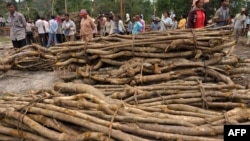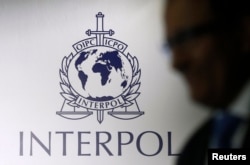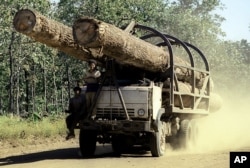Cambodia has asked INTERPOL to investigate its allegations that Vietnam has repeatedly and knowingly accepted fraudulent permits for endangered luxury timber that is illegally logged across the border.
Stocks of Siamese Rosewood, a luxury wood that can fetch tens of thousands of dollars per cubic meter, have been decimated in Cambodia by a rapacious logging industry along the country’s border with Vietnam.
Letters compiled by Cambodia, in a submission to the United Nation’s Convention on International Trade in Endangered Species of Wild Fauna and Flora (CITES) in 2017, show senior government officials repeatedly implored Vietnam to take action.
In 2013 Cambodia banned the logging of Siamese Rosewood (Dalbergia Conchinchinensis) and subsequently told Vietnam that any CITES permit for the species was, as such, fraudulent, the submission shows.
“Vietnam, nevertheless, continued to allow the entry into the country of rosewood, repeatedly referencing CITES permits, notwithstanding that they had been previously informed on several occasions of the illegality of those permits,” wrote Ty Sokhun, the head of Cambodia’s CITES Management Authority, to the UN’s International Environment House in October 2017.
At a UN conference in 2016 “the Cambodia CITES delegation sought an independent investigation by INTERPOL of the relevant circumstances of the case,” he wrote in the letter objecting to Cambodia’s inclusion in a CITES review of significant trade.
EIA senior forests campaigner Jago Wadley said that although though there was much finger pointing over who was responsible for the illicit trade, the evidence against Vietnam in this case was clear.
“Ultimately a state party to a UN convention has testified to the effect that Vietnam knew that fake permits were being used and ignored that information and continued accepting those fake permits,” he told VOA.
“If the Vietnamese management authority has accepted those permits in lieu of information that the permits were fake, then it has done something wrong under the convention and needs to be held accountable.”
VOA inquiries to Ha Thi Tuyet Nga, director of Vietnam’s CITES Management Authority, and the country’s Ministry of Foreign Affairs went unanswered.
Wadley said that Ha Thi Tuyet Nga had, however, replied to EIA in a letter that did not appear to contest the accusation that Vietnam knowingly accepted fake rosewood permits.
“The have put forward an argument that we don’t believe is pertinent, which is that because Cambodia had not asked the CITES secretariat to issue a notification about the fake permits, that importing parties are not in effect responsible to reject those permits,” he said.
“Now we see nothing in the CITES convention that would exonerate an importing country for knowingly accepting fake permits just because the exporting country had not issued a notification through CITES.”
The luxury timber trade is so ferocious along the border that an entire protected forest in the region - The Snuol Wildlife Sanctuary - was literally wiped off the map and formally dissolved in February.
In a briefing released last week, the UN Environmental Investigation Agency (EIA) unearthed Cambodia’s submission in a bid to secure meaningful interventions to curtail the environmental devastation.
The accusations come at a sensitive time for Vietnam, which is close to gaining streamlined access to the EU’s timber market through a scheme - the Voluntary Partnership Agreement - that would see them largely self-regulate their exports.
Inside Cambodia, illegal logging accusations have also been flying, with Deputy Prime Minister Sar Kheng making a series of startlingly frank remarks about the trade in a speech last week.
Sar, who also serves as Minister of Interior, called enforcement efforts “disastrous” according to local media reports.
“We have satellite footage, it is impossible to hide. We watch the timber hauling from one place to another. As far as I know, it is in Mondulkiri province," he reportedly said.
Sar took specific aim at the alleged use of the Sesan II dam reservoir clearance concession as a front for illegal logging far outside the permitted zone.
“They logged trees from another place and claimed that the timber was cleared from the basin. That means the clearing of the reservoir basin has never stopped even though the hydropower dam has already been constructed,” he reportedly said.
Powerful Cambodian Tycoon Kith Meng, who owns the firm licensed to clear that reservoir, has been called out by Cambodian police and government officials before for using the site as an illegal logging front. He did not respond to VOA requests for comment.
In May, EIA detailed three sites of vast illegal logging operations, including some 60 sawmills operating at the Sesan II dam site.
Commercially available data showed at least $75 million worth of timber was transported from Cambodia to Vietnam in the 2017-2018 logging season alone, it found.
Wadley said Siamese Rosewood had been virtually wiped out from these areas after more was traded under fake CITES permits in one year than the entire known global stocks of the species.
“Nobody’s ever really been held accountable for that scandal nor has it been acknowledged formally that Vietnam willfully violated the convention,” he said.
“And really this is about trying to prevent these types of problems happening species after species, year after year, into the future.”






